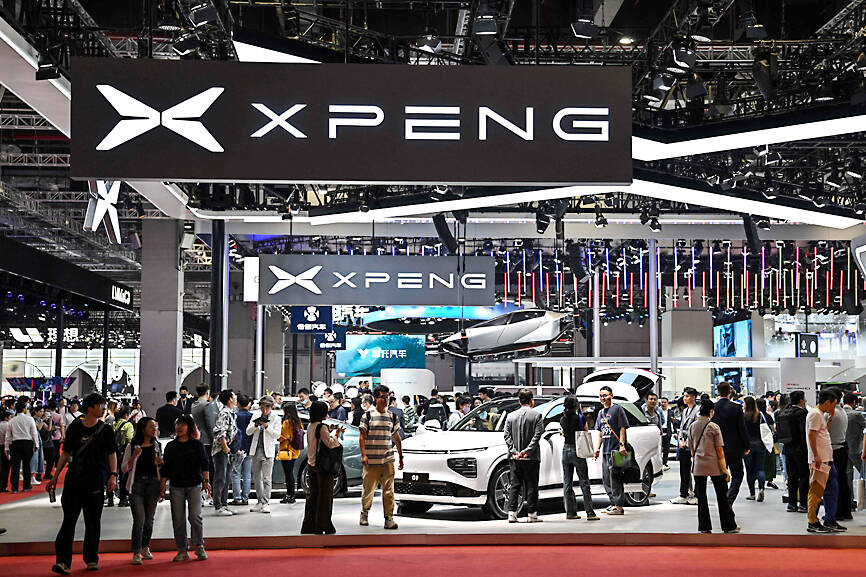Chinese electric vehicle (EV) giant XPeng Inc (小鵬) yesterday said that it would buy the EV subsidiary of ride-hailing platform Didi Global Inc (滴滴) for HK$5.84 billion (US$744.4 million).
The all-stock deal would see Didi emerge with a 3.25 percent stake in the company, XPeng said in a filing to the Hong Kong stock exchange.
Xpeng said it would also partner with Didi to launch a new EV brand next year.

Photo: AFP
Dubbed Project “MONA,” the vehicles would target the mass market segment with a price tag of about 150,000 yuan (US$20,566), it said.
Markets welcomed the deal, which enables the Chinese manufacturer to eliminate a potential competitor and gain access to its advanced technology. XPeng shares gained 10.9 percent yesterday. The brand — which also markets some of its products in Europe — employs about 14,400 people and has offices in Silicon Valley, California and Amsterdam.
XPeng sold 41,435 vehicles in the first half of this year, down 40 percent year-on-year, results published this month showed.
The partnership with Didi comes just more than a month after Xpeng received a US$700 million investment from German auto giant Volkswagen AG to jointly develop EVs for the Chinese market, and should help ease investor concerns about sluggish sales in the face of intensifying competition from the likes of Nio Inc (蔚來), BYD Co (比亞迪) and Tesla Inc.
Separately, the electronics arm of BYD agreed to buy Jabil Inc’s manufacturing business in China for 15.8 billion yuan, expanding its production base in the world’s largest mobile arena.
BYD Electronic International Co (比亞迪電子) is taking over the US company’s product manufacturing business in Chengdu and Wuxi, China, it said in a statement.
The pact includes the manufacturing of products for existing customers.
Additional reporting by Bloomberg

When an apartment comes up for rent in Germany’s big cities, hundreds of prospective tenants often queue down the street to view it, but the acute shortage of affordable housing is getting scant attention ahead of today’s snap general election. “Housing is one of the main problems for people, but nobody talks about it, nobody takes it seriously,” said Andreas Ibel, president of Build Europe, an association representing housing developers. Migration and the sluggish economy top the list of voters’ concerns, but analysts say housing policy fails to break through as returns on investment take time to register, making the

‘SILVER LINING’: Although the news caused TSMC to fall on the local market, an analyst said that as tariffs are not set to go into effect until April, there is still time for negotiations US President Donald Trump on Tuesday said that he would likely impose tariffs on semiconductor, automobile and pharmaceutical imports of about 25 percent, with an announcement coming as soon as April 2 in a move that would represent a dramatic widening of the US leader’s trade war. “I probably will tell you that on April 2, but it’ll be in the neighborhood of 25 percent,” Trump told reporters at his Mar-a-Lago club when asked about his plan for auto tariffs. Asked about similar levies on pharmaceutical drugs and semiconductors, the president said that “it’ll be 25 percent and higher, and it’ll

CHIP BOOM: Revenue for the semiconductor industry is set to reach US$1 trillion by 2032, opening up opportunities for the chip pacakging and testing company, it said ASE Technology Holding Co (日月光投控), the world’s largest provider of outsourced semiconductor assembly and test (OSAT) services, yesterday launched a new advanced manufacturing facility in Penang, Malaysia, aiming to meet growing demand for emerging technologies such as generative artificial intelligence (AI) applications. The US$300 million facility is a critical step in expanding ASE’s global footprint, offering an alternative for customers from the US, Europe, Japan, South Korea and China to assemble and test chips outside of Taiwan amid efforts to diversify supply chains. The plant, the company’s fifth in Malaysia, is part of a strategic expansion plan that would more than triple

Taiwanese artificial intelligence (AI) server makers are expected to make major investments in Texas in May after US President Donald Trump’s first 100 days in office and amid his rising tariff threats, Taiwan Electrical and Electronic Manufacturers’ Association (TEEMA, 台灣電子電機公會) chairman Richard Lee (李詩欽) said yesterday. The association led a delegation of seven AI server manufacturers to Washington, as well as the US states of California, Texas and New Mexico, to discuss land and tax issues, as Taiwanese firms speed up their production plans in the US with many of them seeing Texas as their top option for investment, Lee said. The